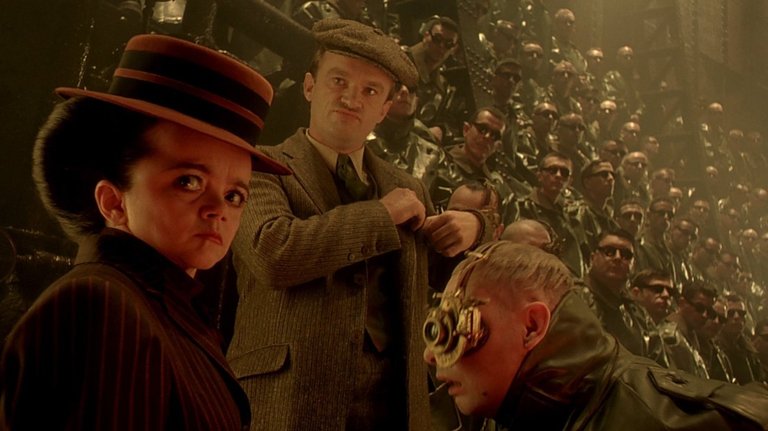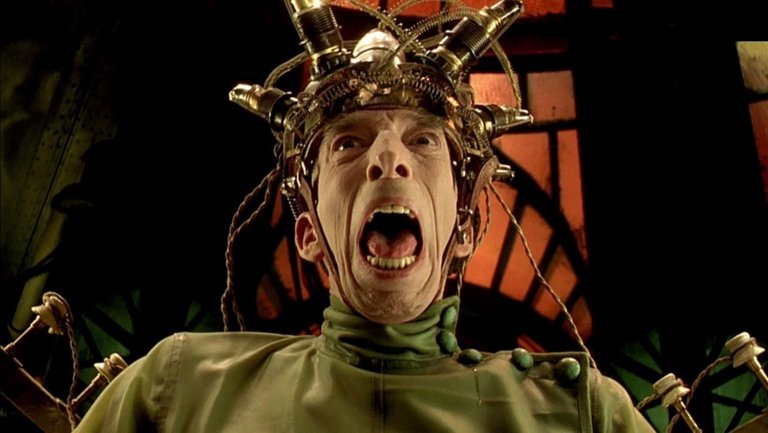Film as Art #30 — The City of Lost Children (1995) by Marc Caro and Jean-Pierre Jeunet
The City of Lost Children (1995)
Dir — Marc Caro and Jean-Pierre JeunetCaro and Jeunet's The City of Lost Children is not exactly a movie made for children, neither can it be tagged as exclusively for the adult audience. Both groups are likely to find something to see for themselves. The film is a bleak fairy-tale adventure with darkest adolescent fears that conjure themselves not under the beds, rather deep in the dead-end of forgotten alleys. There's steampunk-ish science-fiction in there, along with fantasy. The imagined world feels like it is projected by thoughts of a 19th century sci-fi writer, who conjectured artificial intelligence would be created keeping brains in water tanks. Microchips, circuits — haven't been invented yet, neither in the imagined world, nor in the writer's fascination.
The imagined world in the film is detailed with precision. There's a city, old like witches' bones, rusty, damp, moist. Hope gets lost in a place like this. The machines of this civilization are all made with brass, of many different weird shapes and designs. The buildings, the ships have scars made of nuts and bolts, as if further need of aesthetics died on the spot after reaching that stage. The life standard of the people aren't all that great. Excluding everything else in the film, the nihilist dark frames of this city alone give a peculiar feeling that is both born of both the beauty and the grotesque.
The most peculiar is that, the story that dwells within this city is about dreams.
A mad-scientist who goes by the name Krank has lost the ability to dream. Dream as in not the phenomenon itself as a whole, rather dreams laced with happiness and joy, nightmares are absolutely excluded. To be able to dream again, he wants to rob dreams of children and enter them himself, to savor their euphoric taste, to laugh again without remorse, to bath in worriless adolescent. And so he deployed his cyborg army to catch the kids. With one eye on their forehead, like the cyclops from the Greek mythology, the cyborgs creep around the city in the darkness and snatches children people won't look hard if they go missing.

Source
The problem is, the children fear Krank. And their fear translates into their dreams as well, ultimately resulting in nightmares. So Krank needs a child who's mentally tough and resilient enough who will not fear Krank and the dreams too will not turn into nightmares. Hence, his quest for the perfect child and kidnapping him/her continues in the underbelly of the city. When carnival strongman One's (Ron Perlman) little brother make the list of kidnapped children, he commences to rescue his brother with the help of some other delinquent kids of the city.
The most intriguing thing about the film for me is its cinematography, I can't get enough of them! There's a gold tint to everything and the city rejoices silently in light and shadows. The frames are so stylish, I can only admire then one after another, forgetting all about the story. The story was overshadowed by this aesthetic fever dream, perhaps the filmmakers themselves lost themselves in the atmospheric beauty of their own set and frames, and didn't want to bother a lot with the story. Still it is fine and many will love it. It is, after all, unique enough.
I hear there's an interpretation of the film that argues the film is a metaphor of capitalism. I do not feel that way and will avoid such discussion.
Our fascination around dreams are nothing new. Today, in modern days, with the help of collective knowledge of humanity, we know a bit about the nature of dreams, but there was a time when dreams were seen in a much more serious light. Dreams were after all — premonitions. Wishes and commands of gods. This is why kings used to keep experts in their courts to explain the dreams. Heads would roll if the explanations were not in favor! Yet what honor! Gods were whispering into their ears, eh?
Dreams are intriguing nonetheless. Even though they are made of borrowed memories and experiences of the subject, often they resemble nothing from our world. Whether its a monster or a very desirable sequence — they remain aloof. Happy dreams or nightmares — the idea of dreaming is ever fascinating.
Here's the trailer -

You can read more of my film and literature related articles on my hive blog page.


